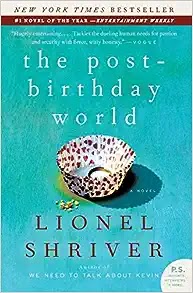Do you know what happens when you go and organize your computer’s unorganized files — a book review you forgot to publish in 2012. But I really do love Lionel Shriver — so here’s to her fantastic novel — The Post-Birthday World.
Lionel Shriver’s novel, ‘The Post-Birthday World’, introduces readers to the life of Irina McGovern, a children’s book author, and illustrator residing in London. An expatriate from America, Irina lives with her intelligent and considerate husband, Lawrence Trainer, who is employed at a prominent think tank. The novel portrays Irina’s seemingly blissful existence with Lawrence and delves into two intriguing yet diverging narratives.
Irina remains steadfastly committed to her marriage in one narrative, while the other embarks on a path filled with illicit romance with Ramsey Acton, a celebrated snooker player. The novel's structure is ingeniously designed, oscillating between two parallel plotlines after the first chapter. Shriver ingeniously uses this technique to depict the duality of choices and their subsequent consequences, a feat that adds a captivating layer to the narrative.
A key incident serves as the catalyst for this dual narrative structure. During an annual dinner with Jude, Irina’s friend, and Ramsey’s former wife, an opportunity presents itself as a possible kiss with Ramsey. What transpires afterward is determined by two possible reactions - either she succumbs to the temptation while her husband Lawrence is away, or she resists it. The narrative splits here, henceforth offering two separate chapters for each version of the events.





